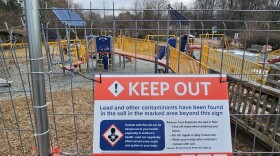Visitors to the Neuse River Greenway can enjoy a large field of blooming sunflowers this month. But the greenway doesn't maintain the bright field of flowers. The sunflowers are actually owned and operated by the Neuse River Resource Recovery Facility, formerly known as the wastewater treatment plant. "Right now it looks like a sea of gold," said Tim Woody, the plant's superintendent, while looking out his office window.
Many Raleigh residents may be unaware that their local wastewater treatment center is also in the business of farming about 1,000 acres of land, including the field of sunflowers, Woody said.
The sunflowers are one of many crops the facility uses to soak up the biosolids from wastewater treatment as fertilizer. Biosolids are the technical term for stabilized sludge left over in the city's wastewater, Woody said.
While that may not sound very aesthetically pleasing, the Resource Recovery Facilty's sunflowers offer a beautiful -- and green -- solution for disposing of the biosolids.
The sunflowers and other crops are fertilized by the nitrogen-rich biosolids, and the plants prevent excess waste run-off into the Neuse River watershed. Then the sunflower seeds are harvested and converted to biofuel to help balance the facilities' energy use.
Woody said the biofuel processing also takes place on site in mobile equipment.
"It's a big 18-wheel tractor trailer with all the equipment inside of it to allow you to process an oil seed, like sunflower," he said. "You pour it in the top and biodiesel comes out the other side."
The facility is planning its first full harvest of its sunflower seeds this fall. The sunflower field is just one contribution toward the facility's ultimate goal of reaching zero net energy use.








